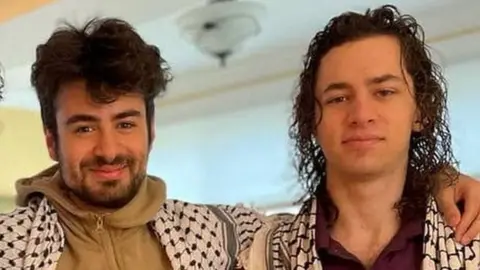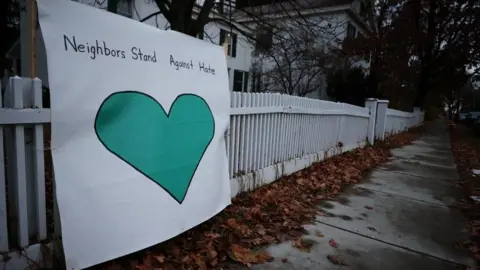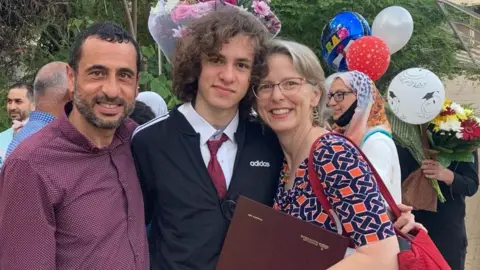Burlington, Vermont, shootings leave one troubling question: Why?
 Awartani family
Awartani familyAfter a gunman shot three students of Palestinian descent in the US state of Vermont, police quickly made an arrest. But days later, they are still searching for a motive and say there is not yet enough evidence to call it a hate crime.
When Jason Eaton allegedly approached three young men with a handgun in a quiet Burlington neighbourhood on Saturday evening, he did not say a word.
He then fired at least four shots at close range, police said, striking each of the students.
Relatives of the victims, who have survived the shooting, believe the attack was a deliberate hate crime at a time of heightened tensions over the ongoing Israel-Gaza war.
The men, Hisham Awartani, Tahseen Aliahmad and Kinnan Abdalhamid, were speaking a mix of English and Arabic when they were shot on a street close to the University of Vermont campus. Two of them were also wearing keffiyehs, a traditional Palestinian scarf.
"We have no doubt that our sons were targeted simply for being Palestinian," the families of the men said in a statement on Tuesday.
The mother of Mr Awartani, who is the most seriously injured out of the three with a bullet lodged in his spine, told the BBC she believed the attack was a hate crime.
"This man did not accept people who were different from him. And he wanted to destroy that," said Elizabeth Price, who headed back to Vermont after the shooting, from her home in the West Bank.
But while police have released lots of evidence as to why they believe Mr Eaton was the man who shot the 20-year-olds, an alleged motive remains elusive.
The gunman's silence during the attack meant he did not declare his intentions. And interviews with the suspect's family and neighbours, plus a BBC review of his extensive postings online, have also found no obvious clues as to what may have inspired the shooting.
Mr Eaton was arrested and charged with three counts of attempted second-degree murder, to which he pleaded not guilty on Monday.
At a news conference later, Burlington Police Chief Jon Murad said: "We still do not know as much as we want to know." He also cautioned the public not to jump to conclusions.
Under Vermont law, Mr Eaton faces 20 years to life in prison if he is found guilty. If the attack is proven to be a hate crime, it could lead to a higher prison sentence. Federal charges could also be brought after the FBI opened an investigation.
But to prove a hate crime was committed, prosecutors must find evidence that the attack was motivated by bias or prejudice that the suspect held against a specific group - a bar that has been difficult to meet in this case so far.
Little is known about Mr Eaton in his Burlington neighbourhood. The 48-year-old lived on a second floor of an old boarding house on North Prospect Street, in an area with a mix of student housing and old family homes.
The three men were gunned down just outside Mr Eaton's residence, after returning from a birthday party at a local bowling alley for Mr Awartani's eight-year-old twin cousins.
A neighbour across the street from Mr Eaton, who has lived in the area for decades, told the BBC that she did not know him and had not seen him before. Police said he had recently moved from Syracuse in New York state.
Gabby Caforia, a student who lives two houses down and witnessed the shooting, said that she, too, was unsure of who Mr Eaton was. "It is all traumatising, and now I feel like this is not a safe area," Ms Caforia said.
 Reuters
ReutersWhen investigators approached Mr Eaton at his apartment in the hours after the attack, police say he held his hands out and told them: "I've been waiting for you."
When the federal agents asked him why, he replied that he would like a lawyer. At his home, police recovered a handgun that he had recently purchased, as well as ammunition similar to bullets found at the scene of the crime. A computer was also seized, which police said they would search in their quest to find a motive.
In an interview with the Daily Beast, the suspect's mother, Mary Reed, said she had seen him two days earlier on Thanksgiving, but he did not mention the Israel-Gaza war over dinner. She added that her son had struggled with depression, and was a "very religious person".
His most recent employer, CUSO Financial Services, said in a statement to the BBC that he was laid off from his job on 8 November. On social media, clues related to any possible motive are equally sparse. He posted voluminously on his accounts and his own website about farming, financial topics and politics.
Some of his writings veered into conspiratorial topics, for instance anti-vaccine pseudoscience and a possible reference to "New World Order" conspiracy theories that allege secret plans are afoot to impose a totalitarian worldwide government.
In an apparent biblical reference, he described himself on his website as "Casting out the money lenders since 2003". Other pages on his site appear to criticise "fiat money" - commonly used currencies as opposed to gold and digital tokens like Bitcoin - and usury, the charging of interest on loans.
But most of Mr Eaton's publicly available posts show little sign of the raw hatred, obsession about race and ethnicity, or clear ideological motivation that is often seen in the writings of other mass shooters.
By contrast, authorities in Plainfield, Illinois, were quick to label the killing of a six-year-old Palestinian boy and the attempted murder of his mother last month as a hate crime.
Prosecutors in that case noted that the suspect, Joseph Czuba, had become increasingly agitated about the Israel-Hamas conflict. According to court documents citing an interview with his wife, Mr Czuba regularly listened to conservative talk radio and was worried about reports of a "National Day of Jihad" on 13 October.
The following day, prosecutors said, he started an argument about the Middle East and attacked his lodgers, Hanaan Shahin and her son Wadea Al-Fayoume.
Mr Czuba has pleaded not guilty to hate crimes and murder, and faces a trial next year.
In a number of other cases, accused killers have left long strings of messages online or documents that shed light on their motivations.
 The Awartani Family
The Awartani FamilyAt Monday's press conference in Burlington, Sarah George, the top prosecutor for the county, acknowledged the need to find more evidence before bringing a hate crime charge. "I do want to be clear that there is no question this was a hateful act," she added.
Mr Awartani's uncle, Rich Price, told the BBC that his family had great confidence in the legal system. "I understand that from a legal perspective, the threshold to prove that this was a hate crime is quite high," Mr Price said.
"But it is quite evident that these boys were targeted because of how they looked, what language they spoke and how they dressed."
Mr Price added the attack had put a spotlight on hatred and vitriol in the US, especially the rise in anti-Arab sentiment and Islamophobia due to the ongoing Israel-Gaza war.
And in response to reports about Mr Eaton's background and the search for a motive, family members of the victims said that there was simply no justification for "this heinous and hate-filled crime".
"One of our kids may never walk again, and they will all live with this trauma for the rest of their lives," they said.
(Additional reporting by Eloise Alanna)
